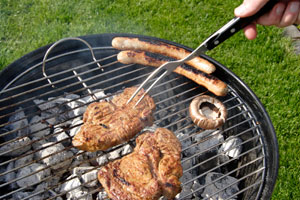Barbeque Blues

Barbeque Blues
Pollution and cancer hazards mar a staple of summertime living.
By Susan Weiner, Energy Times
When it comes to grilling meat over an open fire, early humans beat us to the punch some 30,000 years ago. But present-day folks indulging in chicken and cheeseburgers face concerns prehistoric man never envisioned: air pollutants and cancer-causing compounds.
 Researchers have confirmed that grilling meats creates not one, but two types of compounds that can lead to cancer. What’s more, both briquettes and lump charcoal burn “dirty,” spewing hydrocarbons and soot particles that hasten global warming and contribute to health problems. Still, few among us can resist the pungent bouquet of barbecue. So instead of dodging crispy beef kabobs, learn to grill without the guilt and fewer health risks.
Researchers have confirmed that grilling meats creates not one, but two types of compounds that can lead to cancer. What’s more, both briquettes and lump charcoal burn “dirty,” spewing hydrocarbons and soot particles that hasten global warming and contribute to health problems. Still, few among us can resist the pungent bouquet of barbecue. So instead of dodging crispy beef kabobs, learn to grill without the guilt and fewer health risks.
Grills Kill
Barbecue emissions rank well below those from motor vehicles and industry but the environmental effects are just as harmful, given that burning charcoal contributes to smog and, ultimately, global warming. Further, lump charcoal is made from charred wood, a factor in deforestation. A 2005 study from the University of California at Berkeley reports that just the emission-generating production of charcoal is harmful.
“It can be compared to fuels we use in furnaces and water heaters, including oil, gas and wood,” says Joseph Laquatra, PhD, Hazel E. Reed Human Ecology Extension Professor in Family Policy at Cornell University. “Like other fuels, charcoal produces respirable particles, or soot, when it is burned. These particles are air pollutants and microscopic solids that are inhaled and deposited in the lungs.” Particle pollution has been linked to asthma, strokes, heart attacks, lung cancer and reduced life expectancy.
When the Fat Hits the Grill
When animal fat drips onto the flame of either a charcoal or a gas grill it triggers carcinogenic compounds known as polycyclic aromatic hydrocarbons (PAHs) that rise with the smoke and deposit on the meat. Other harmful chemicals, heterocyclic amines (HCAs), are formed on the food as it chars. The more time a hamburger, let’s say, spends on the grill, the more HCAs are created. These compounds do not form on vegetables—it’s the reaction with animal-based foods that generates them. However, over-charred food of any kind contains other types of cancer-causing substances.
“Grilling is simply a method of cooking that adds to the formation and deposit of cancer-causing substances on meat,” explains Michael Thun, MD, vice president, Epidemiology and Surveillance Research for the American Cancer Society. “Both substances are undesirable. They are both carcinogenic.”
The high heat of grill cooking produces more HCAs than, say, oven roasting or baking at lower temperatures, which create negligible amounts. But burgers, beef and chicken must be cooked at temperatures high enough to destroy E. coli and other illness-producing bugs.
So what’s a backyard barbecue enthusiast to do? “Cancer risk is influenced much more by long-term patterns than occasional patterns,” says Thun. “The goal is to have a diet that balances calories you take in with calories you put out, and to eat a diet rich in fruits and vegetables.”
Grill Tricks
Since animal production is the largest source of the greenhouse gas methane and contributes to deforestation, grilling less meat and more vegetables reduces pollution on many levels. Additionally, vegetarian sources of protein, such as tofu, veggie burgers and mock meats, contain few or no HCAs when grilled. For those summer days when you can’t resist barbecue, forgo traditional charcoal for so-called “natural charcoal,” made from environmentally friendly wood sources and low-emission plant wastes such as coconut shells. All-natural charcoals should be chemical-free and derived from private farms, not clear-cut forests.
To minimize cancerous compounds on the grill, Karen Collins, MS, RD, CDN, with the American Institute for Cancer Research, says to cook at lower temperatures and flip the meat every one to two minutes. Marinating meat, poultry and seafood or precooking it in a microwave for two minutes also reduces HCA compounds. To lessen PAH formation, grill lower-fat meats with fewer fat drippings.
“Limit the animal protein portion and make vegetables and grains a larger part of the meal,” says Collins. “By this one simple step you minimize the carcinogens from the grilled meat and maximize a whole array of cancer-protective vitamins and natural compounds from the plant foods.”
Americans are about as likely to renounce barbecue as they are baseball—no one really expects you to say no to Uncle Joe’s char-cooked steak. So sit back, fire up some natural charcoal and enjoy some broccoli with that marinated burger. Your body, and the earth, will thank you.